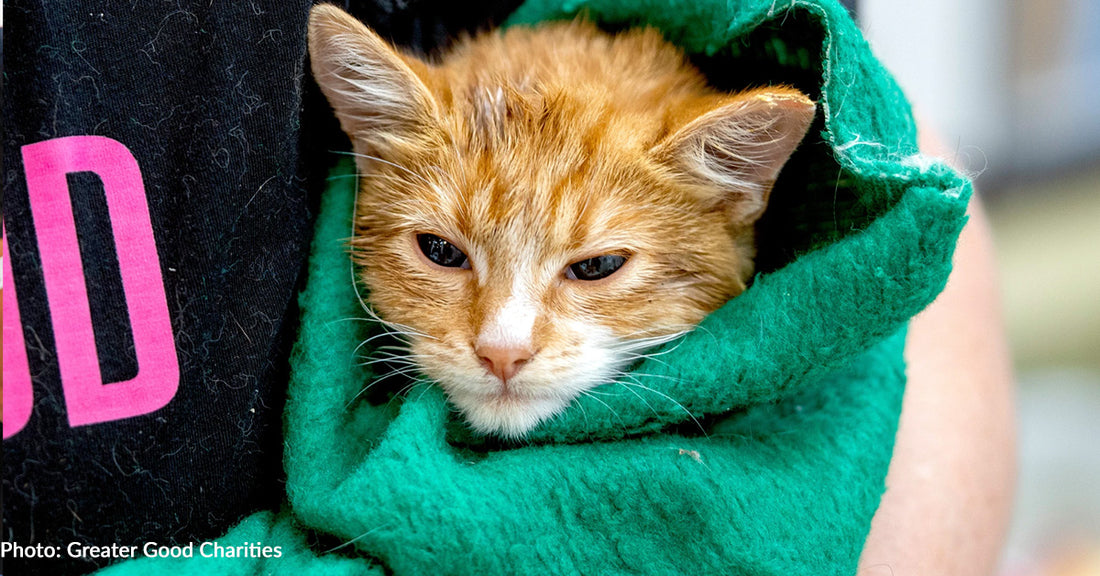Free Spay/Neuter Clinics Are Saving Lives In United States And Ukraine
Andrea Powell
According to Spay-Neuter Assistance Program (SNAP), one unspayed female cat and her offspring can give birth to roughly 4,948 kittens over seven years. One unspayed female dog and her offspring can have over 500 puppies. The solution to overpopulation of dogs and cats is to spay and neuter.
The last Tuesday is February is dedicated to raising awareness of the importance of spay/neuter on what is known as World Spay Day. It all started with Doris Day and her Animal League in 1995.
At that time, the euthanasia rate at animal shelters was a staggering 14 and 17 million dogs and cats each year. The Doris Day Animal Foundation has worked with The Humane Society of the United States to provide grants for spay/neuter in the U.S. and around the world and helped spay/neuter tens of thousands of pets.
 Photo: Greater Good Charities
Photo: Greater Good CharitiesSadly, animal shelters are still overcrowded and struggling to find homes for all the pets in their care. While the number of euthanized pets in the U.S. has declined to a million, it is still far too many.
Spaying or neutering is the best way to lower the number of homeless animals. Numerous animal organizations have started TNR (Trap, Neuter, Return) programs to help control the populations of feral cats and street dogs. Greater Good Charities' Good Fix program is another that helps spay/neuter pets near and far.
 Photo: Greater Good Charities
Photo: Greater Good CharitiesThe Good Fix initiative is working hard to deploy specially trained high-quality, high-volume spay/neuter (HQHVSN) surgical teams and professional trapping teams to help control pet overpopulation in communities that need it most, all free of charge.
 Photo: Greater Good Charities
Photo: Greater Good CharitiesThanks to your continued support, the Good Fix team was able to travel across the United States and to Ukraine to host spay/neuter clinics.
Vaccinations are also provided to pets as well as education to shelters on TNR programs and sharing with locals why it is so important to spay/neuter. "Ultimately, Good Fix reduces human-animal conflict, reduce shelter intake, and relieve the burden on animal shelters to euthanize unwanted pets."
 Photo: Greater Good Charities
Photo: Greater Good CharitiesIn late September, Dr. Ruth Parkin and her team of volunteers headed back to Ukraine for their second clinic. A total of 747 pets, including owned and homeless pets, were spayed or neutered. It was a life-changing experience for the pets and volunteers. Dr. Ruth recalls, "Working in Ukraine has been an experience I’ll never forget. We have met so many very kind and motivated people who are focused on moving innocent animals out of harm's way, while having their own lives upended by an unwelcome war in their country. Sterilization of displaced animals helps to control overpopulation of homeless animals and assists in rescued animals being transported out of the country to find a stable home."
 Photo: Greater Good Charities
Photo: Greater Good CharitiesJust a couple weeks later, the team headed to Oklahoma for another clinic. They worked long days and managed to spay/neuter 1,263 free roaming cats, owned cats, free roaming dogs, and owned dogs.
 Photo: Greater Good Charities
Photo: Greater Good CharitiesSince the program launched in October 2021, more than 56,0000 cats and dogs have been spayed or neutered. This is a team effort to help fight the overpopulation problems in underserved communities across the U.S. and in Ukraine.
Dr. Ruth shared with us just how important these clinics are, "In areas where veterinarians are scarce or the residents do not have the resources to pay for even basic services, free sterilization clinics can have an enormous positive impact on that community’s overall health. We often take for granted in the US that pets are spayed or neutered and vaccinated, but in a lot of places that basic care is out of financial or geographic reach for owners. These dogs and cats can then become unintended contributors to unchecked breeding and the spread of diseases among animals, or worse, zoonotic diseases such as rabies or larval migrans. Greater Good Charities' Good Fix team is capable of sterilizing 1,000 animals over just a few days which can have an immediate impact on a community."
 Photo: Greater Good Charities
Photo: Greater Good CharitiesIn addition to the volunteer vets and vet techs, experienced trapping teams, local partners and countless other volunteers work together to save and improve the lives of animals in their community.
 Photo: Greater Good Charities
Photo: Greater Good CharitiesYour donations help fund these clinics and ultimately save lives. "The impact is real: Greater Good Charities believes high-quality, high-volume sterilization combined with strategic trapping efforts is the most effective and humane method of dog/cat population control."
It costs just $20 to sterilize a cat or dog, preventing hundreds of unwanted kittens or puppies.
Donate now!
Pet overpopulation is an issue around the world. We are currently supporting efforts in Greece to help care and neuter over 600 dogs living at a dump. Join us in improving the lives of these homeless dogs.
 Photo: Angel's Garden
Photo: Angel's GardenBenefits to Spay/Neuter
Aside from reducing the number of homeless pets, there are several health and behavior benefits to spaying or neutering your pet.
ASPCA shares that your pet can live a longer life. Spaying a female before their first heat can prevent uterine infections and decrease the chance of breast tumors in both dogs and cats. It will also prevent accidents in the house during heat cycles.
 Photo: Greater Good Charities
Photo: Greater Good CharitiesNeutering a male prevents testicular cancer and can help reduce marking his territory indoors. It will also help decrease the unwanted "humping" behavior of other dogs and people.
It is also way cheaper than caring for a litter of puppies or kittens. Plus, it will save lives by not adding unexpected or unwanted pets to the already overcrowded animal shelters.


